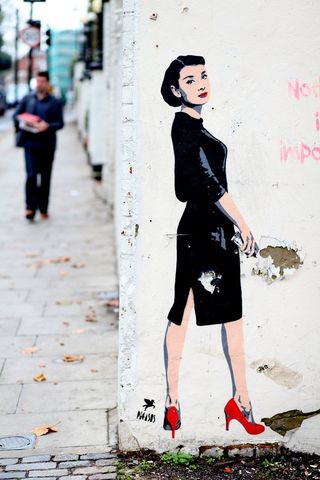Ethics and Morality
Are We All Hypocrites?
To my “hypocrite lecteur — mon semblable — mon frère!”
Posted April 30, 2016

A long time ago people used to make money by doing a very peculiar job. They were hypocrites!
In ancient Greece the hypocrite would not have hurt a fly. He was neither a liar nor a fake person. Rather the opposite, the hypocrite used to earn her money in a very proper way.
In fact, the hypocrite was the Tom Cruise or Penelope Cruz of antiquity. Hypocrites were simply actors who on stage had to pick the right words and right tones to give shape to a writer’s fantasy. Generally they were males. Their work of interpreting or judging what to say behind a mask and sometimes — in the case of dithyrambs (hymns sung and danced in honor of Dionysos) — improvising on a theme, became synonymous for work suited for a two-faced man.
The word hypocrite, from the neutral amalgam of the prefix hypo-, meaning “under”, and the verb krinein, meaning “to sift or decide”, pointed to the ability to sift through or decide upon the right words to use. Their decision came from ‘under’ because their voice was amplified by a disposable mask of linen or cork that they used for the interpretation of many different characters in the theatre.
Whereas “hypocrite” was a technical term for a stage actor, “hypocrisy” was, and somehow still is today, the tool for actors, rhetoricians, and debaters to interpret their thoughts in a diplomatic way. Specifically, in rhetoric and debate “hypocrisy” was used as a means to understand each side of an argument, setting to one side one’s own position in order to give more space to a stranger’s argument, to understand it better. In that case, paradoxically, the mask’s function was to create a closer contact with others without being dominated by one’s own inner tyrant: the ego.
After all, we are always obliged to wear a mask in order to live an intersubjective life. James Ensor, the great painter, understood it perfectly. Being in contact with someone else means mediating between ourselves and the other. Being a person, from Latin persona (“mask”, per and soneo – “resound”) means precisely “being a mask”.
The Transgender Side of Hypocrisy
The word “hypocrisy” began to hold a negative meaning in the 4th century B.C., when hypocrisy met politics. I will spare you any comment on this, it is too easy! The great orator Demosthenes ridiculed his rival Aeschines because he had been a successful actor and politician. You can imagine Aeschines as the Ronald Reagan of the 4th century. His career as an actor and a politician made him the perfect hypocrite, impersonating characters on the stage and delivering political speeches to his audience.
In contemporary literature “hypocrisy” has become a paradox, portraying sincerity as something that actually comes from one’s ability to be two-faced. Hypocrisy therefore acquired a sense of fluidity, a sort of loyalty to the multiplicity of one’s own psyche.
T. S. Eliot, for example, examined the character of Tiresias, the blind seer, and considered him the perfect hypocrite.

Indeed, Eliot wondered, if hypocrisy is merely a person pretending to do something he cannot, then Tiresias may be one of history’s earliest hypocrites. In Book XI of the Odyssey, as well as in Eliot’s Waste Land, Tiresias' appearance is a metaphor for the ambiguity of life. Life cannot be coherent. Tiresias is a blind man, but at the same time he proclaims that he can see, in fact that he sees better than others. Also, since he was cursed by the gods for 7 years, he is obliged to live a transgender life, this “old man with wrinkled female breasts”. Tiresias is a liar and an honest man. But his only way of being honest is to accept the paradox of his life and be authentic in his hypocrisy.
In his poem Eliot used Tiresias as the mythical symbol for the hypocritical identity. For Eliot’s Waste Land, Tiresias functions as a unifying figure linking the ancient and modern worlds, rebuilding a myth of unity for modern world. In this poem, so full of despair and disorder, the reimagined Tiresias reactivates his ancient role of being one and many at the same time; he is a humble character who demonstrates little control over the paradoxical multiplicity of all of his/her facets. Eliot appears to indicate that the waste land will not be perpetual; the fluidity of being a person and the multiplicity of meanings will give way to the unifications of The Four Quartets. The hypocrisy lies in the imperfection of this unification, in the limit of our masks.
We seem to be doomed to live as hypocrites (in the best-case scenario) because we are condemned to live as one and wear only one mask at a time, despite the multiplicity that characterizes each moment of our life. Milton once wrote that hypocrisy “walks invisible” from “the will of a permissive god”.
The Hypocrisy of Time
There is another curious novel written by Davenpol Selina, The Hypocrite or the Modern Janus, that reactivated the bridge between antiquity and modernity using the figure of Janus. Janus, another hypocrite par excellence, is the deceiver and at the same time the god that allows for transition.
Time is hypocritical for no other reason than that it has two faces. Like Janus, Time looks to the beginning and the end all at once, at the goal and the achievement. By its nature, it is two-faced.

Consistent with that, Janus had no flamen or specialized priest (sacerdos) assigned to him, but the King of the Sacred Rites (rex sacrorum) himself carried out his ceremonies all around because his god was ubiquitous and his ceremonies took place throughout the year everywhere. He was ritually invoked at the beginning of each ceremony, regardless of the main deity being honored on any particular occasion.
Time is a deceiver and so is the god that manages its transition. In order to be we need to be in time and flow with it, without knowing in every moment what we are and where we are going. We can only accept the limits of our transience.
To the Hypocritical Reader
This is the reason why one of the greatest books of the nineteenth century – Baudelaire’s Fleurs du Mal – was dedicated to the hypocritical reader. The hypocritical reader is the only possible reader, the most human one.
Baudelaire’s poems about the disappointment, disillusion, spleen and joy of life could not be addressed to a romantic reader. He is writing to a human being, to someone who knows what contradictions, disquiet, and doubt are. “La sottise, l’erreur, le péché, la lésine.” He is writing to Janus and Tiresias, to someone who is one and many at the same time. He is writing to a hypocrite, who can wear just one mask at a time to express the flow of faces that life entails. “La conscience est dans le mal” or at least in the awareness of the inevitability of our hypocrisy.
BOOKS ON THE TOPIC
E. Adriani, Storia del teatro antico, Carocci, 2005.
R.W. Grant, Hypocrisy and Integrity: Machiavelli, Rousseau, and the ethics of politics, University Chicago Press, 1997.
R. C. Naso, Dissociation, Shame, and the Ethics of Inauthenticity, Littlefield Publisher, 2010.




